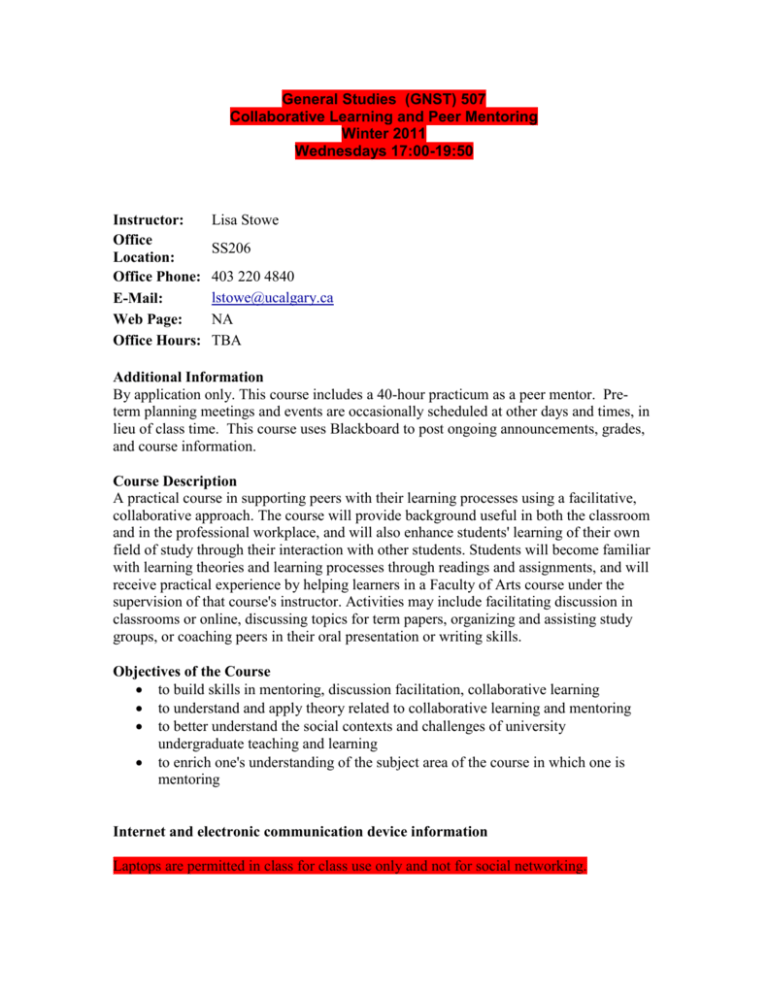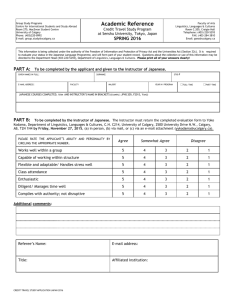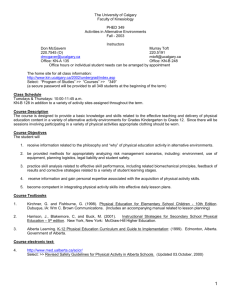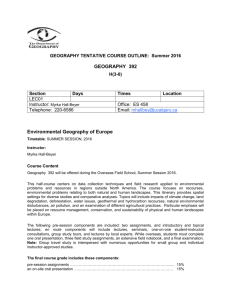Course number and section - Faculty of Arts
advertisement

General Studies (GNST) 507 Collaborative Learning and Peer Mentoring Winter 2011 Wednesdays 17:00-19:50 Instructor: Office Location: Office Phone: E-Mail: Web Page: Office Hours: Lisa Stowe SS206 403 220 4840 lstowe@ucalgary.ca NA TBA Additional Information By application only. This course includes a 40-hour practicum as a peer mentor. Preterm planning meetings and events are occasionally scheduled at other days and times, in lieu of class time. This course uses Blackboard to post ongoing announcements, grades, and course information. Course Description A practical course in supporting peers with their learning processes using a facilitative, collaborative approach. The course will provide background useful in both the classroom and in the professional workplace, and will also enhance students' learning of their own field of study through their interaction with other students. Students will become familiar with learning theories and learning processes through readings and assignments, and will receive practical experience by helping learners in a Faculty of Arts course under the supervision of that course's instructor. Activities may include facilitating discussion in classrooms or online, discussing topics for term papers, organizing and assisting study groups, or coaching peers in their oral presentation or writing skills. Objectives of the Course to build skills in mentoring, discussion facilitation, collaborative learning to understand and apply theory related to collaborative learning and mentoring to better understand the social contexts and challenges of university undergraduate teaching and learning to enrich one's understanding of the subject area of the course in which one is mentoring Internet and electronic communication device information Laptops are permitted in class for class use only and not for social networking. Textbooks and Readings: Dewey, John. (1997). Experience and Education. New York. Touchstone. Smith, Tania; Rabbitte, Caleigh & Robinson, Stephen. (2009) L. Cheal, T. Smith and T. Spark, (eds). “Curricular Peer Mentoring: A Handbook for Undergraduate Peer Mentors Serving in Courses”. Victoria, B.C. Trafford Publishing. Other course materials will be available on Blackboard throughout the semester. Assignments and Evaluation Semester plan: 5% Due: January 26, 2011 Reflections 6 at 5% each: Due: throughout the semester via Digital dropbox on Bb Mid-term portfolio: 15%: Due: February 16, 2011 Final portfolio: 15%: Due: April 13, 2011 Final report: Due: April 13, 2011 20%: Participation: 15%: Ongoing Complete explanation of the assignments will be on Blackboard. Note: Please submit assignments directly to the instructor. If it is not possible to do so because of illness or unexpected life events, a daytime drop box is available in SS110; a date stamp is provided for your use. A night drop box is also available for after-hours submission. Assignments will be removed the following morning, stamped with the previous day's date, and placed in the instructor's mailbox. It is the student's responsibility to keep a copy of each submitted assignment. Note: Please hand in your essays directly to your tutor or instructor if possible. If it is not possible to do so, a daytime drop box is available in SS110; a date stamp is provided for your use. A night drop box is also available for after-hours submission. Assignments will be removed the following morning, stamped with the previous day's date, and placed in the instructor's mailbox. Registrar-scheduled Final Examination: No Policy for Late Assignments Assignments submitted after the deadline may be penalized with the loss of a grade (e.g.: A- to B+) for each day late. Freedom of Information and Protection of Privacy Act This course is conducted in accordance with the Freedom of Information and Protection of Privacy Act (FOIP). As one consequence, students should identify themselves on all written work by placing their name on the front page and their ID number. Also you will be required to provide a piece of picture identification in order to pick up an assignment or look at a final exam from SS110 after classes have ended. For more information see also http://www.ucalgary.ca/secretariat/privacy. Writing Skills Statement Department policy directs that all written assignments (including, although to a lesser extent, written exam responses) will be assessed at least partly on writing skills. For details see http://www.comcul.ucalgary.ca/needtoknow. Writing skills include not only surface correctness (grammar, punctuation, sentence structure, etc) but also general clarity and organization. Research papers must be properly documented. If you need help with your writing, you may use the Writing Centre. Visit the website for more details: www.efwr.ucalgary.ca Grading System The following grading system is used in the Department of Communication and Culture: (Revised, effective September 2008) A+ A AB+ B Grading Scale 96-100 90-95.99 85-89.99 80-84.99 75-79.99 BC+ C CD+ D F 70-74.99 65-69.99 60-64.99 55-59.99 53-54.99 50-52.99 0-49 Where a grade on a particular assignment is expressed as a letter grade, it will normally be converted to a number using the midpoint of the scale. That is, A- would be converted to 87.5 for calculation purposes. F will be converted to zero. Plagiarism Using any source whatsoever without clearly documenting it is a serious academic offense. Consequences include failure on the assignment, failure in the course and possibly suspension or expulsion from the university. You must document not only direct quotations but also paraphrases and ideas where they appear in your text. A reference list at the end is insufficient by itself. Readers must be able to tell exactly where your words and ideas end and other people’s words and ideas begin. This includes assignments submitted in non-traditional formats such as Web pages or visual media, and material taken from such sources. Please consult your instructor or the Writing Centre (MacEwan Student Centre 4th floor, efwr.ucalgary.ca) if you have any questions regarding how to document sources. Academic Misconduct For information on academic misconduct and the consequences thereof please see the current University of Calgary Calendar at the following link; http://www.ucalgary.ca/pubs/calendar/current/k.html Students with Disabilities If you are a student with a disability who may require academic accommodation, it is your responsibility to register with the Disability Resource Centre (220-8237) and discuss your needs with your instructor no later than fourteen (14) days after the start of the course. Students' Union For details about the current Students' Union contacts for the Faculty of Arts see http://www.su.ucalgary.ca/governance/elections/home.html Student Ombudsman For details on the Student Ombudsman’s Office see http://www.su.ucalgary.ca/services/student-services/student-rights.html Emergency Evacuation and Assembly points For information on the emergency evacuation procedures and the assembly points see http://www.ucalgary.ca/emergencyplan/assemblypoints "SAFEWALK" Program -- 220-5333 Campus Security will escort individuals day or night -- call 220-5333 for assistance. Use any campus phone, emergency phone or the yellow phone located at most parking lot booths. Program Information Centre For a first point of contact please visit us in SS110 or phone 403-220-3580 for guidance on where to go for information on Campus. Ethics Whenever you perform research with human participants (i.e. surveys, interviews, observation) as part of your university studies, you are responsible for following university research ethics guidelines. Your instructor must review and approve of your research plans and supervise your research. For more information about your research ethics responsibilities, see The University of Calgary Research Ethics site: http://www.ucalgary.ca/research/cfreb Instructors’ Research To improve the quality of teaching in this subject area, Dr. Tania Smith and/or your instructor occasionally analyzes data about student learning that is gathered naturally in the course of teaching, and may present these findings at conferences or in academic publications. Unless you give signed consent, data specific to your course work and participation will not be included in such research. During course evaluation time, or after the course is over, Dr. Smith and/or the instructor may hand out consent forms or email you a request to use your work outside of the course. You are free to decline participation or withdraw participation at any time. Any signed consent forms will not be seen by the instructor until after the final grades have been submitted. Schedule of Lectures and Readings TBA






